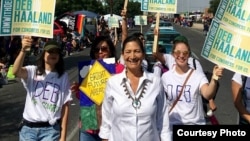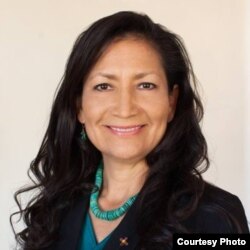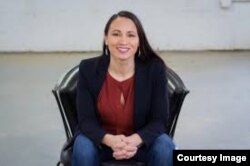Native Americans are underrepresented in Washington's corridors of power. Three known Native Americans have served in the Senate and fewer than 20 in the House of Representatives. But three Native American women are running in 2018 midterm elections, widely viewed as a pivotal vote that could not only tip the balance of power but strengthen Native American voices in lawmaking.
Debra Haaland
Debra Haaland, 57, a Democrat and member of the San Felipe Pueblo, hopes to represent New Mexico’s 1st Congressional District in Congress.
Haaland served as the state’s Native American vote director during then-President Barack Obama’s 2012 campaign. She is credited with getting a 60 percent voter turnout from Native American precincts, nearly 90 percent of which voted for Obama.
Haaland went on to become the first Native American woman to chair the Democratic Party of New Mexico. In 2014, she failed in a bid to become New Mexico’s lieutenant governor, losing to the Republican incumbent.
Haaland has served as the San Felipe Pueblo’s tribal administrator and was the first woman on the Laguna Development Corporation's board of directors in Albuquerque.
Haaland is an outspoken critic of U.S. President Donald Trump.
“The Trump administration is the worst nightmare to happen to the environment in decades,” she said. “And then we’ve got the Bureau of Land Management working overtime to sell off leases to lands so that people can frack. And they’re doing that near Chaco Canyon, my ancestral homeland and a treasure to every single New Mexican and every single American.”
This University of New Mexico law school graduate is also critical of Trump’s immigration policy.
“I’m ready to go to bat for any immigrant in my community who is in fear of being deported,” she said. “The worst thing about this whole turning ICE [Immigration and Customs Enforcement] on communities is that it splits up families. And I come from a community of people whose families have been split up enough by governmental policies, and that should never happen.”
Sharice Davids
Sharice Davids, 37, is a member of the Ho-Chunk Nation of Wisconsin and a Democrat. She is among seven candidates looking to represent Kansas’ Third Congressional District in Washington. A graduate of Cornell Law school, she began her career as a corporate transactional attorney and later moved to the Pine Ridge Indian Reservation in South Dakota, where she developed an entrepreneurship curriculum for the Red Cloud Indian School and served as deputy director of the Thunder Valley Community Development Corporation. She also started a Native American-owned and operated coffee company.
“We found a way to source the coffee from small farms that were co-oped and from indigenous coffee growers,” she said. “And we also focused on teaching women entrepreneurial and leadership skills.”
In 2016, Davids served as a White House Fellow, assigned to the Department of Transportation.
“I worked on a number of community engagement, transparency and community education initiatives aimed at helping inform people on how decisions are made, who makes the decisions, how can they get involved in the decision making process.” She said the knowledge will serve her well in Congress.
In Washington, Davids said she would work to protect undocumented immigrants who have worked and contributed to U.S. communities. She would also focus on protecting natural resources and implementing gun safety laws to avoid tragedies such as the recent school shooting in Florida.
Eve Reyes-Aguirre
Eve Reyes-Aguirre, 42, an Izkaloteka Mexican Native from Phoenix, is the Green Party candidate for U.S. Senate. She calls herself an “unconventional politician,” and refuses to accept funding from corporate giants or special interest groups.
“It’s not about me as an individual or even as a candidate. It’s about the issues that are affecting our communities, our families, everyday citizens and even non-citizens alike,” she said.
The environment figures heavily in her platform.
“I think people don’t grasp the gravity of deregulating and opening up areas to mining and fossil fuel extraction. As an indigenous woman, that’s been something that we have been fighting against for many generations.”
But this isn’t just an indigenous issue, she said.
“We are seeing how corporations and the lack of regulation are affecting the drinking water for everybody. These are human issues. And they are issues that are going to affect our children and their children if we don’t do something about it,” she said.
Reyes-Aguirre said she believes that in tackling immigration, the U.S. government should look at some of its own policies.
“We’ve noticed an influx of migration, particularly from Mexico and the South. I think that we need to start looking at the root problems and not just try to fix those issues with band aids, like the wall,” she said. “Those folks who are fleeing from violence, I call them economic refugees because of trade agreements that U.S. corporations are benefiting from.”
Reyes-Aguirre has never held political office, but represented the women of her community at the United Nations Permanent Forum on Indigenous Issues from 2009 to 2017 and co-chaired the Global Indigenous Women’s Caucus until last year.
The 2018 midterm election will decide all 435 seats in the U.S. House of Representatives and 34 of 100 U.S. Senate seats. It is widely viewed as a critical test of Trump and the conservative legislative agenda.














